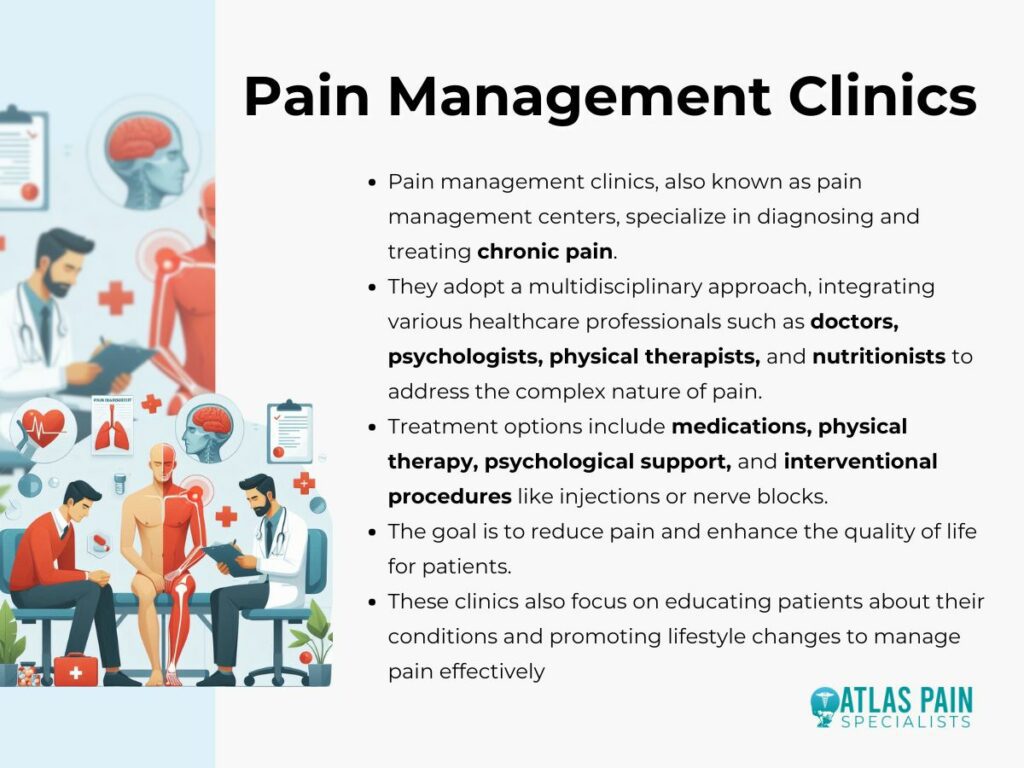

How to Choose the Right Pain Management Clinic
Selecting the right pain management clinic is crucial for effectively managing chronic pain and improving your quality of life. With numerous clinics offering various treatments, it’s important to consider key factors such as specialization, range of services, practitioner expertise, and available telehealth options.
By carefully evaluating each clinic, you can find one that aligns with your specific needs and offers a comprehensive approach to pain management. This guide will help you understand what to look for in a pain clinic, ensuring you make an informed choice for long-term relief and well-being. Let's look at how to choose the right pain management clinic.
Understanding Pain Management Clinics
Before diving into the process of selecting a clinic, it’s important to understand what pain management clinics are and their purpose. These clinics specialize in diagnosing and treating chronic pain, using various techniques to improve the patient’s quality of life.
The goal is to provide long-term pain relief by addressing the underlying causes of pain or managing the symptoms effectively. Pain management clinics often take a holistic approach to treatment, considering physical, emotional, and mental well-being.

Types of Pain Management Clinics
There are two main types of pain management clinics, and understanding the difference can help narrow your choices:
- Procedure-Focused Clinics
These clinics emphasize interventional treatments and procedures, such as nerve blocks, steroid injections, and radiofrequency ablation. The primary focus here is reducing pain through targeted interventions, often performed by specialists like anesthesiologists, orthopedic surgeons, or pain specialists. - Interdisciplinary Clinics
These clinics take a more comprehensive approach, involving multiple healthcare professionals like doctors, physical therapists, psychologists, and nutritionists. They often provide a combination of treatments such as medication, physical therapy, counseling, and lifestyle modifications. This approach is ideal for those who want to explore a wider range of pain management techniques beyond just procedures.

Initial Steps in Finding a Pain Management Clinic
Choosing the right pain management clinic requires careful research and consideration. Below are two important steps to begin your search.
A. Consult Your Primary Care Physician
Your primary care physician (PCP) is often the best place to start when looking for a pain management clinic. They know your medical history and can provide valuable referrals based on your condition and needs.
Importance of Referrals
A referral from your PCP adds a layer of trust to your decision-making process. Your doctor will likely refer you to a reputable clinic with specialists experienced in managing your type of pain.
Additionally, many insurance plans require a referral before covering visits to specialists like pain management doctors. Therefore, consulting your PCP not only helps in finding the right clinic but also ensures your treatment is covered by insurance.

Discussing Pain History and Treatment Options
When consulting your PCP, discuss your pain history in detail, including past treatments and their effectiveness. Your doctor can help you determine the type of pain management approach that might work best for you, whether it’s interventional procedures or a more holistic, interdisciplinary approach.
Based on this conversation, they can guide you toward a clinic that aligns with your specific needs.
B. Research Pain Support Groups
Pain management isn’t just about medical treatments—it’s also about emotional and psychological support. Pain support groups, both online and in-person, can be a great resource when searching for the right clinic.
Benefits of Community Support
Joining a pain support group can provide you with emotional relief and encouragement from others who understand your struggles. These communities can offer insights into various treatment experiences, what worked or didn’t work for others, and which clinics they recommend. The shared experiences can help you feel less isolated in your journey toward pain management.
Gathering Recommendations from Peers
Support groups can be an excellent way to gather first-hand recommendations. Many people in these groups have likely visited several clinics and can share their honest experiences, including the quality of care, professionalism of the staff, and overall effectiveness of treatments.

This information can be invaluable when you’re trying to narrow down your options.
Key Factors to Consider When Choosing a Clinic
When evaluating a pain management clinic, several factors should be weighed carefully to ensure you receive the best care possible.
A. Specialization and Expertise
The first step in finding the right clinic is ensuring that it specializes in treating your specific pain condition. Chronic pain comes in many forms, from neuropathic pain to musculoskeletal conditions, and finding specialists familiar with your condition can greatly improve treatment outcomes.
Importance of Finding Specialists Familiar with Specific Pain Conditions
Each type of chronic pain requires a unique treatment approach, and general pain management techniques may not always be effective. Clinics specializing in your specific pain condition, whether it’s sciatica, fibromyalgia, or complex regional pain syndrome, will have a deeper understanding of the most effective treatments and interventions.
These specialists will also be more adept at managing the unique challenges associated with your condition.
Verification of Board Certification and Training
To ensure the quality of care, verify that the clinic’s practitioners are board-certified in pain management or relevant specialties like anesthesiology, physical medicine, or neurology.
Certification indicates that the provider has received specific training in pain management and has passed rigorous exams in this area. Board certification also shows that the practitioner adheres to continuing education requirements to stay current with evolving treatment methods.
B. Range of Services Offered
A well-rounded clinic will offer a variety of services to address chronic pain from multiple angles. Pain management is not a one-size-fits-all solution, and having access to a broad range of treatments increases the likelihood of finding a combination that works for you.
Overview of Treatment Options
Effective pain management often includes a mix of interventions, such as physical therapy, psychological therapies like cognitive-behavioral therapy (CBT), medications, and interventional procedures (e.g., injections, nerve blocks). The clinic you choose should offer a comprehensive array of treatments so you can explore multiple options and tailor your care plan.
Importance of a Multidisciplinary Approach
Multidisciplinary clinics, which bring together experts from different fields, can provide a more holistic treatment plan. For instance, a clinic that combines medical treatments with physical rehabilitation and psychological support may offer better long-term outcomes than one that focuses solely on medication or procedures.
C. Credentials and Experience of Practitioners
While a clinic’s range of services is important, the quality of the practitioners delivering those services is equally critical.
- Checking Qualifications and Experience: It’s important to check the credentials and experience of the clinic’s team. Look for practitioners who are board-certified and have a proven track record in treating your specific type of pain. More experienced practitioners will have seen a wider range of cases and are more likely to offer effective solutions, even for complex or rare conditions.
- Importance of Experience with Specific Pain Conditions: Experience is especially important if your pain condition is rare or difficult to treat. Specialists with years of experience treating patients with conditions like trigeminal neuralgia or cluster headaches will be more adept at managing your care, as they have likely refined their treatment strategies over time.
D. Telehealth Options
Telehealth has emerged as a valuable tool in pain management, especially for patients who may have mobility issues or live far from a clinic.
- Availability of Virtual Consultations: Virtual consultations allow patients to receive guidance, follow-up care, and consultations without the need to travel. This can be particularly beneficial for those with severe pain that makes traveling difficult or for patients living in rural areas.
- Benefits for Mobility-Challenged Patients: For those with limited mobility, telehealth offers an accessible option for staying in touch with healthcare providers, adjusting medications, or receiving counseling. A clinic that offers robust telehealth services ensures that you can maintain consistent care without the added burden of traveling.
E. Insurance Coverage and Payment Options
Understanding your insurance coverage and available payment options is a crucial step in selecting a pain management clinic. Treatment for chronic pain can be ongoing, and costs can add up quickly.
- Importance of Understanding Coverage Details: Before committing to a clinic, check whether it accepts your health insurance. Ensure that any treatments or procedures you may need are covered under your plan. Ask for a detailed breakdown of what your insurance will cover, including consultations, procedures, and follow-up appointments.
- Inquiring About Self-Pay Options and Discounts: If you don’t have insurance or your coverage is limited, inquire about self-pay options. Many clinics offer payment plans or discounts for patients who pay out of pocket. It’s also important to ask about any hidden fees or additional costs that may arise during treatment, such as for diagnostic tests or specialized procedures.
Questions to Ask Potential Clinics
Once you’ve identified some potential clinics, it’s essential to ask specific questions to evaluate their suitability for your needs.
A. Treatment Approaches
The clinic’s approach to treatment can greatly impact your care experience. You’ll want to understand whether they take a holistic approach or focus more on medication-based therapies.
- Types of Therapies and Interventions Available: Ask about the specific types of treatments the clinic offers. Does the clinic focus on interventional procedures, such as nerve blocks or epidurals, or do they provide a broader range of services like physical therapy, acupuncture, or psychological support?
- Focus on Holistic Care vs. Medication-Centric Approaches: A clinic that offers holistic care will provide a range of non-medication treatments, such as physical therapy, counseling, or alternative therapies like acupuncture. Holistic clinics aim to treat the whole person, not just the symptoms, which can lead to better overall outcomes.
B. Patient Support and Education
A good clinic doesn’t just treat your pain—they support and educate you throughout your journey.
- Availability of Support Groups and Educational Resources: Ask if the clinic offers patient support groups or educational materials to help you better understand your condition. Support groups provide a space for patients to share their experiences and learn from one another, while educational resources can empower you to take an active role in your treatment.
- Opportunities for Family Involvement in Treatment Planning: Chronic pain affects not only the patient but also their loved ones. Some clinics encourage family involvement in treatment planning, which can provide additional emotional support and help family members better understand your pain and the treatment process.
Red Flags to Avoid
While searching for the right clinic, there are certain warning signs that you should be aware of. Avoid clinics that exhibit the following red flags:
A. Clinics Focused Solely on Narcotics
Some clinics may over-rely on narcotics or opioids to manage pain. While opioids can be an effective short-term solution, they carry the risk of dependency and often don’t address the root cause of pain.
- Risks Associated with Opioid Dependency: Long-term use of opioids can lead to tolerance, dependence, and even addiction. It’s important to choose a clinic that offers a comprehensive treatment plan rather than solely prescribing narcotics. The clinic should explore other options like physical therapy, psychological support, or interventional treatments to manage your pain.
- Importance of a Comprehensive Treatment Plan: A clinic that offers a variety of treatments shows that they are invested in treating your pain in a comprehensive manner, not just masking it with medication. Look for clinics that emphasize long-term solutions and rehabilitation rather than quick fixes.
Lack of Transparency or Communication
Communication is key to successful pain management. Avoid clinics that are unclear or evasive about treatment plans, costs, or expected outcomes.
- Importance of Clear Communication About Treatment Plans and Progress: The clinic should communicate openly about your treatment options, expected outcomes, and potential risks. You should feel empowered to ask questions, and the staff should be willing to explain your care plan in a way that you can easily understand. A lack of transparency or poor communication is a red flag that the clinic may not prioritize patient-centered care.
Conclusion
Choosing the right pain management clinic can significantly impact your journey toward managing chronic pain. By prioritizing specialization, a multidisciplinary approach, and experienced practitioners, you can find a clinic that provides effective, personalized care.
Don’t hesitate to ask important questions about treatment options and patient support, and remain mindful of red flags like over-reliance on narcotics. With careful consideration and research, you can select a clinic that helps improve your pain management and overall quality of life, guiding you toward a more comfortable and fulfilling future.
About Dr. Sean Ormond



